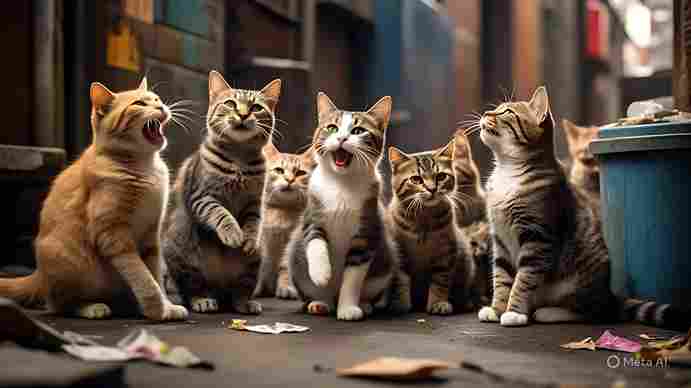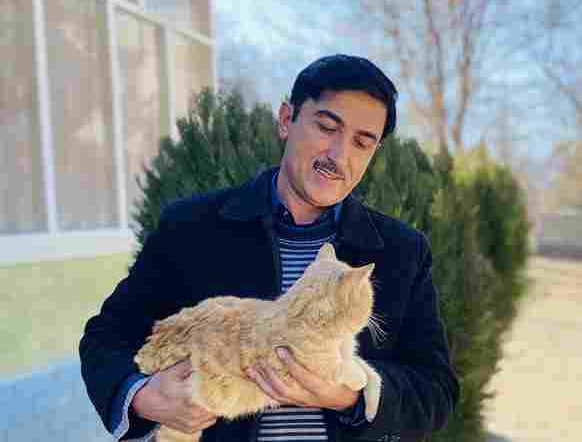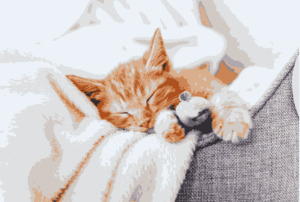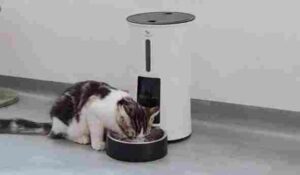Don’t worry if your cat meows often; you are not alone. Though it could seem like meaningless noise, cats meow for many of different reasons—and usually it’s their way of contact with you. Adult cats usually save their meows just for people, not other cats. Cats frequently meow enthusiastically when they know food is coming, which is their way of showing expectation and ensuring you don’t forget about them! This behavior is related to positive reinforcement; over time, they learn that meowing produces results, especially when tasty treats are involved. It’s not only hunger; it’s also enthusiasm and some planning!
Let’s break down the most common reasons your cat won’t stop talking, and what science and veterinarians say about each one.

Table of Contents
🧍♀️ 1. Attention-Seeking: “Hey, Look at Me!”
Cats are smart. Really smart. They learn that meowing gets your attention—whether it’s for cuddles, playtime, or simply to make you turn your head.
📌 Expert Tip: “Don’t reward meowing with treats or play every time, or you may reinforce the behavior,” says Dr. Karen Becker, integrative vet [Healthy Pets, 2023].
💬 2. Communication: Their Way of Talking to You
Cats meow mostly to interact with people, not other cats. Kittens meow to their mothers, whereas adult cats largely “speak” to people—telling you they are hungry, irritated, inquisitive, or simply happy to see you.
🔬 Science Fact: Cats change the pitch and length of their meows based on the urgency of their request, according to a 2019 Animal Cognition research publication. Fundamentally, they know how to guilt-trip you using sound.
🏥 3. Medical Issues: When Meowing Is a Red Flag 🚨

A cat that suddenly starts meowing more than usual could be trying to indicate anguish or discomfort. Medical conditions such as urinary tract infections, hyperthyroidism, or perhaps dental problems can generate distress vocalizations.
🩺 Vet Tip: “Always rule out health issues first if your cat’s meowing suddenly increaseshttps://www.webmd.com/pets/cats/cats-excessive-meowing,” advises Dr. Marty Becker [VetStreet, 2022].
😿 4. Stress or Anxiety: “Something Feels Off”
Anxiety might result from changes in the house—such as shifting furniture, getting new pets, or even noisy disturbances. When cats feel insecure or overburdened, they may meow more.
🧠 Science Insight: 2018 Journal of Feline Medicine and Surgery findings show that higher stress hormone cortisol levels in cats have been associated with behavioral changes such as excessive meowing.
Comfort Tip:🧘 Feliway and regular routines will help your cat to feel secure; use calming sprays.
💘 5. Mating Behavior: The Love Song No One Asked For

Unsprayed or unmated cats meow long and loudly during mating season. This is particularly prevalent among outdoor or feral cats.
🧬 Biological Fact: This behavior is connected to hormonal changes and the innate drive to reproduce.
✅ Expert Advice: Spaying or neutering your cat offers health advantages as well as helps to lower this form of vocalization.
🧠 6. Cognitive Dysfunction in Older Cats: Confused and Vocal
Cats can acquire cognitive problems comparable to dementia as they age. An older cat could—especially at night—meow more since she is perplexed or nervous
📊 Stat: Stat: Over 50% of cats over age 15 show signs of feline cognitive dysfunction [Cornell Feline Health Center, 2021].
🕯️ Care Tip:: Keep lights on at night and avoid rearranging furniture to reduce nighttime disorientation.
done
🧃 7. Hunger or Thirst: The Classic Complaint
A hungry or thirsty cat won’t hesitate to let you know—with volume. If the food bowl is empty or water is stale, expect vocal protests.
📌 Expert Reminder: “Cats thrive on routine feeding. Use a timed feeder to avoid excessive begging,” recommends Dr. Jean Hofve, holistic vet [Little Big Cat, 2023].
🧸 8. Boredom: A Vocal Cry for Fun
Cats are natural hunters, Indoor living can occasionally be boring for natural hunters. A bored cat may meow incessantly just to find something to occupy herself.
🎯 Enrichment Tip: Puzzle feeders, interactive toys, and daily playtime reduce boredom meows.
FAQs
1. Why does my cat meow so much when it sees me?
Your cat is saying hello, not just being loud! Cats usually meow when they see their favorite humans as a kind of greeting and to solicit attention. Adult cats seldom meow at one another; they have developed this behavior mostly for us humans, according to animal behaviorists. Over time, they discover that meowing brings love, snacks, or food, hence developing a great means of communication.
2. Should I be worried if my cat suddenly starts meowing more than usual?
Yes, particularly if the conduct is new or appears extreme. An abrupt rise in vocalization could point to pain, suffering, or a medical condition including hyperthyroidism, urinary tract infections, or arthritis. First, always see a veterinarian to rule out health issues. [ VetStreet , Dr. Marty Becker , 2022]
3. Why does my cat meow loudly at night?
Nighttime meowing can be caused by several things: hunger, boredom, aging, or even cognitive dysfunction in senior cats (similar to dementia in humans). Older cats may become confused and vocal when they feel disoriented in the dark. Keep a night light on and maintain a familiar setup, it can help reduce stress and confusion. [Cornell Feline Health Center, 2021]
4. Is my cat meowing because it’s bored?
Absolutely, it’s quite possible! Cats are curious, active creatures that need both mental and physical stimulation. Should they not get it, they could meow to pass the time or to get attention. Regular gaming, climbing challenges, and interactive toys may help to lower vocalization associated with boredom.
5. Will spaying or neutering my cat stop excessive meowing?
Usually, yes. Unspayed females and unneutered males often howl loudly during mating season from hormonal alterations. This behavior is instinctive and motivated by the need to reproduce. Besides minimizing this vocal activity, spaying or neutering has long-term health advantages and helps to avoid unplanned litters.

Karim Kaifi is an experienced pet owner and writer. He shares practical, research-backed advice based on over 10 years of caring for cats and dogs.






